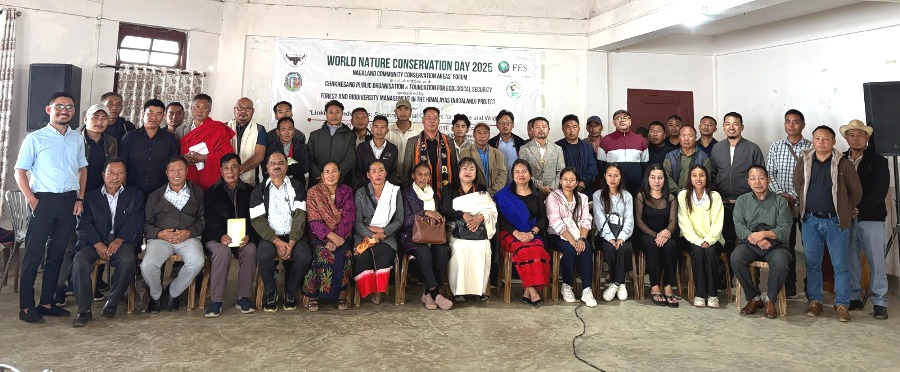SATURDAY, AUGUST 02, 2025
- Home
- World Nature Conservation Day observed at Pfutsero town
World Nature Conservation Day observed at Pfutsero town
Nagaland Community Conservation Awareness Forum observes World Nature Conservation Day 2025 at Tourist Lodge, Pfutsero town.
Published on Jul 28, 2025
Share

MOKOKCHUNG — Nagaland Community Conservation Awareness Forum (NCCAF), in collaboration with the Chakhesang Public Organisation (CPO) and Foundation for Ecological Security (FES), on Monday observed World Nature Conservation Day 2025 at Tourist Lodge, Pfutsero town, Phek district.
The programme, held on the theme ‘Establishing wildlife corridors in Phek district: Strategies for connectivity,’ was sponsored by the Forest and Biodiversity Management in the Himalayas (Nagaland) Project.
The event began with an inaugural session which was chaired by Dr. Limasenla Jamir, information secretary of NCCAF invocation by Rev. Dr. Tshulingupe Kapfo, pastor of Pfutsero Town Baptist Church.
In his welcome address, Heirang Lungalang, chairman of NCCAF, briefed the gathering on the forum’s ongoing work in promoting community-led conservation in Nagaland.
Vezühü Keyho, president of Chakhesang Public Organisation, delivered a short speech on traditional conservation practices that have long supported biodiversity preservation in the region.
Special guest for the event, Rhosietsho Nguori, Deputy Commissioner of Phek, in his addressed, highlighted the urgency of discussing animal corridors in light of growing human-wildlife conflicts, particularly in Wokha district.
Also read: Nagaland observes World Hepatitis Day with awareness drives, screenings
The DC congratulated the works of CPO saying that perhaps CPO will be the only hoho in Nagaland that has resolved to preserve and conserve biodiversity in the land.
Nguori emphasised that community change requires a shift in people's mindsets and habits, particularly eating habits, which would ultimately impact conservation efforts.
Enyiwekha Wezah, Divisional Forest Officer of Phek, in his keynote address on ‘Establishing wildlife corridors in Phek district,’ highlighted their importance for species migration, survival, and ecological balance.
He explained that corridors enable animals to move for breeding, food, and survival, especially in changing climates, and support ecosystem functions like seed dispersal.
“We must safeguard these natural routes by avoiding disruption through activities like jhum cultivation or paddy field expansion,” he said.
Wezah also called for a scientific approach to study the history of animal movements and raising community awareness. “Where animal corridors are protected, breeding increases and population thrives,” he added.
He further stressed the need for inter-village and inter-district cooperation, noting that successful corridors require collective effort even across state boundaries.
“When both neighbouring villages commit to this cause, we not only protect wildlife but also contribute to a larger conservation mission—one that serves not just a community, but all of humanity,” he concluded.
The technical session was facilitated by the Foundation for Ecological Security (FES). Senior Programme Manager at FES, Sanjay Sharma, presented a study titled ‘Mapping critical corridors: Phek district’s ecological network,’ offering data-backed insights into the ecological fragility and opportunity zones for intervention, which was followed by an engaging interactive Q&A session.
The programme concluded with a vote of thanks by Wepekha Wetsah, treasurer of CPO, and benediction by Solhou Sono, pastor of Pfutsero Town CRC.
The event saw participation from village councils under Phek district, civil society organisations, church leaders, and forest officials. A notable effort of NCCAF is that in all of their events, they urge all village councils to send at least three representatives—including one woman representative—for future conservation consultations to ensure inclusive decision-making.

